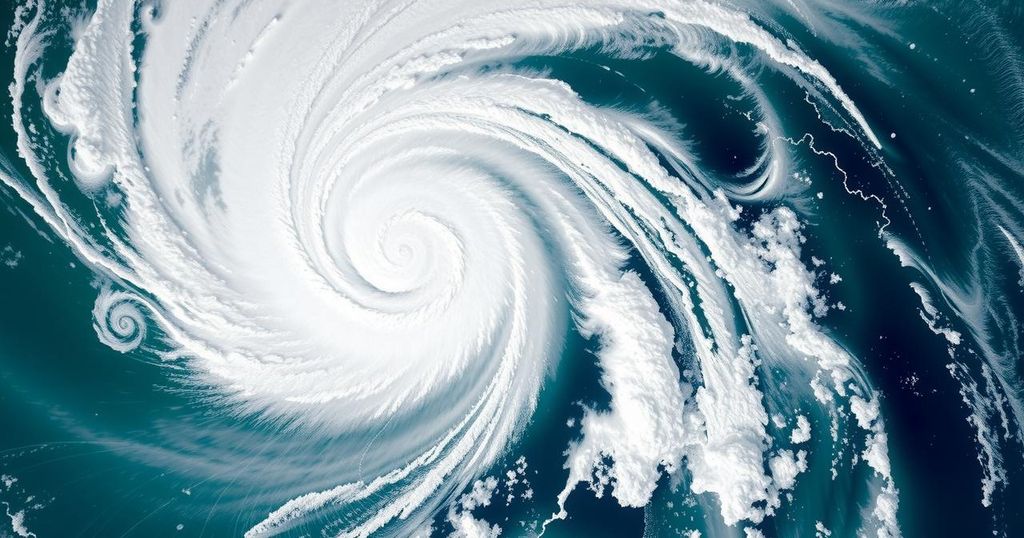World news
AFRICA, ATLANTIC OCEAN, CABO DELGADO, CHI, CHIURE, EMERGENCY RELIEF, EMERGENCY RESPONSE, INDIAN OCEAN, ISA, ISADORA ZONI, ISLAMIC STATE, MECUFI, MOZAMBIQUE, NATIONAL INSTITUTE FOR NATURAL DISASTERS, NATURAL DISASTER, NATURAL DISASTERS, UNITED NATIONS, UNITED NATIONS ’ REFUGEE AGENCY, UNITED NATIONS OFFICE FOR THE COORDINATION OF HUMANITARIAN AFFAIRS, ZONI
Jamal Abdullah
0 Comments
Cyclone Chido Inflicts Severe Damage in Mozambique, Death Toll Rises to 75
Cyclone Chido has devastated Mozambique, causing a death toll that has risen to 75, nearly double previous estimates. Striking an already troubled Cabo Delgado province, the cyclone has severely affected many refugees from ongoing conflicts. Rescue efforts reveal widespread destruction, necessitating urgent humanitarian response to assist affected populations.
The death toll from Cyclone Chido in Mozambique has surged to 75, nearly doubling previous figures, as officials reporting from the field confirm the breadth of destruction inflicted by the storm. This cyclone struck the northern Cabo Delgado province, which is already grappling with the aftermath of a protracted insurgent conflict linked to groups associated with the Islamic State. Consequently, many residents had already fled their homes, compounding the tragedy caused by Chido’s arrival.
According to the National Institute for Natural Disasters, the cyclone resulted in the loss of at least 69 lives and left about 740 individuals injured. As rescue teams ventured into isolated regions, they faced significant challenges navigating the eroded roadways. Reports from the district of Mecufi illustrated devastation, with a majority of structures having been obliterated. UN refugee agency representative Isadora Zoni remarked on the overwhelming level of destruction encountered, stating, “What you see is utter destruction.”
Mozambique, recognized as one of the world’s least affluent nations, continues to be significantly affected by climate change, routinely enduring storms originating from the southern Indian Ocean. When Cyclone Chido struck, it swept away mud homes and devastated wooden dwellings, leaving behind ruins. Zoni provided photographs of rubble, revealing overturned healthcare facilities and classrooms left in tatters, where only crumpled textbooks remained.
In Cabo Delgado, the impact of the storm affected around 10,000 individuals who were already living in temporary conditions due to prior conflicts. Many of these people, whose lives have been disrupted by violence, are now facing another layer of adversity due to climate-related disasters. Wind speeds reached 115 miles per hour, classifying Cyclone Chido as a Category 3 hurricane equivalent. Prior to its landfall in Mozambique, the cyclone adversely affected Mayotte, a nearby French territory, where at least 31 fatalities were reported.
Experts from the UN refugee agency warn that Cyclone Chido could indicate the onset of a severe rainy season. Historical data showcases that this period has historically led to an influx of cyclones and flooding in the region. Last year, Tropical Cyclone Freddy resulted in substantial casualties, and Cyclone Gombe claimed 63 lives in 2022. Over recent years, extreme weather events have triggered the displacement of approximately 140,000 individuals within Mozambique, signaling an ongoing humanitarian crisis exacerbated by climate change.
Cyclone Chido has emerged as a catastrophic natural disaster, significantly affecting Mozambique’s Cabo Delgado province, an area already beleaguered by conflicts and crises. Mozambique is characterized as one of the poorest nations globally and is prone to recurrent weather-related adversities due to its geographical positioning within the southern Indian Ocean typhoon belt. The entangled factors of climate change, ongoing insurgency, and natural calamities present a grave challenge for the populace, who are struggling to regain stability amidst these compounding crises. Cyclone Chido’s recent devastation is a stark reminder of the perilous conditions faced by many in the region as they contend with both man-made and natural disasters.
In summary, the devastation wrought by Cyclone Chido in Mozambique has tragically claimed at least 75 lives, exacerbating an already complex humanitarian situation in a region impacted by a long-standing insurgency. The cyclone’s destruction serves to highlight the urgent need for comprehensive disaster preparedness and response measures in light of the increasing frequency of extreme weather events linked to climate change. With many people displaced and vulnerable, immediate humanitarian assistance and potential long-term recovery strategies are critical for addressing the profound challenges ahead.
Original Source: www.nytimes.com




Post Comment